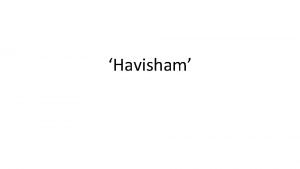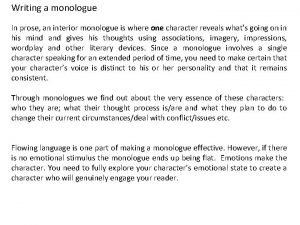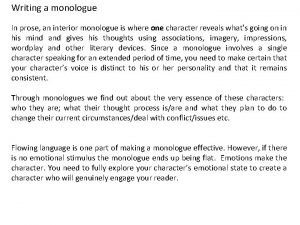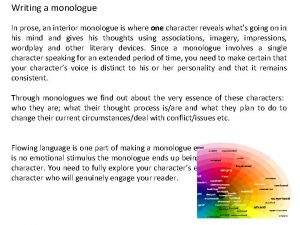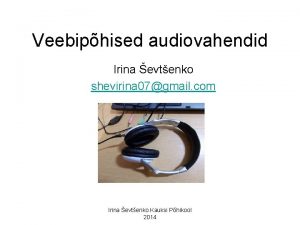HOW TO IMPROVE SPEAKING MONOLOGUE IRINA LEONOVA Two












- Slides: 12

HOW TO IMPROVE SPEAKING (MONOLOGUE) IRINA LEONOVA

Two Truths and a Lie

A good way to develop speaking is… https: //www. speakalley. com 1. In class under the professional English teacher’s guidance. 2. In a café with a native speaker of English (not necessarily a teacher) 3. Living in a country where people speak English 4. Watching You. Tube videos you like, films and TV in English. 6. Repeating what the teacher says in class. 7. Keeping a notebook of new words. 8. Doing some English homework (writing or reading) very often. 9. Having lots of tests in class to help us remember. 10. Using a bilingual dictionary all the time. 11. Reading in English. 12. Speaking English with other students in the class. 13. Listening to podcasts*or radio programmes. 14 Speaking Online 15. Recording on audio (using a smartphone) yourself speaking and then listening back to see how your English sounds to other people.

Word Cloud http: //worditout. com/word-cloud/make-a-new-one

An original text Music is the universal language of the world with some meaning at least for the immense majority of people. It is the mirror of our lives and life problems. People can’t live without music. It is everywhere at home, in a concert hall, in parks at the seaside and even in the forest. Nowadays it thunders out of every high-street shop, hotel, restaurant, public transport. Music is an art, which reflects life, people’s ideas and emotions. There are different musical genres: symphony, concerto, opera, ballet and others. http: //s-english. ru

http: //mind 42. com/public

TABOO One player describes a word they are given. The others try to guess the top word without using any of the 'taboo' words underneath it. Sometimes the guessers ask questions and sometimes the describer speaks about the words they have been given. But don't say any of the words that you are describing. The guessers must guess them. Don't say the word. You may use the following phrases: • This is a person who. . . • This is a thing that. . • We use this thing to. . • This is the opposite of. . . • We do this when we. . • We do this if. . http: //eslspeaking. org/esl-speaking-game-for-kids-adults

Problem Solving • 1. You are alone at a restaurant one night. After you finish the meal, you discover that you had left your wallet at home. You also discover that your cell phone is dead. You cannot remember any of your friends’ numbers. The restaurant tells you that you MUST pay or they will call the police. If you couldn’t ask a friend to bring you money, how would you solve this problem? http: //www. lessonplansdigger. com

“The Birthday Party” http: //www. englishforeveryone. org Today is my birthday. I am having a big party at my house. I invited everyone in my class. I hope that they all come. My doorbell is ringing. I answer it. …. .

“Diamante Poem” Beginning Topic Adjective, Adjective (about beginning topic) -ing word, -ing word (about beginning topic) Four nouns –or- a short phrase (about both beginning and ending topics) -ing word, -ing word (about ending topic) Adjective, Adjective (about ending topic) Ending Topic (Synonym/Antonym)

REFERENCES 1. D. Holmes. Speaking activities for the classroom. Copyright 2004 http: //www. noblepath. info/speaking/apeaking_activities. pdf 2. P. Watcyn-Jones. Vocabulary games and activities for teachers. Penguin Books Ltd 1993 3. R. Gairns and S. Redman Oxford Word Skills. Oxford University Press, 2006 4. http: //britishenglishcoach. com/33 -ways-to-speak-better-eng…/ 5. E. R. Febriyanti ” Teaching Speaking of English as a Foreign Language: Problems and Solutions” http: //download. portalgaruda. org 6. Speaking Activities for Large ESL Classes http: //how-to-teachenglish. ontesol. com/speaking-activities-for-large-esl-classes/ 7. Speaking activities http: //www. lessonplansdigger. com 8. Teaching Speaking: Activities to Promote Speaking in a Second Language (The Internet TESL Journal) http: //iteslj. org/Techniques/Kayi-Teaching. Speaking. html 9. https: //www. mindmeister. com/de/97399321/hobby 10. http: //worditout. com)



